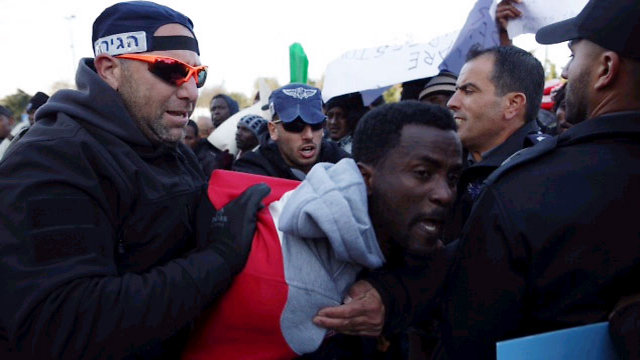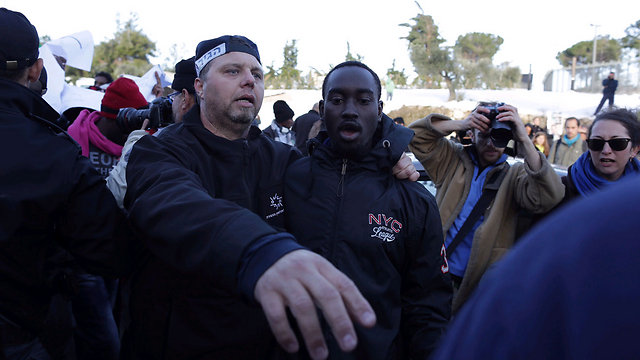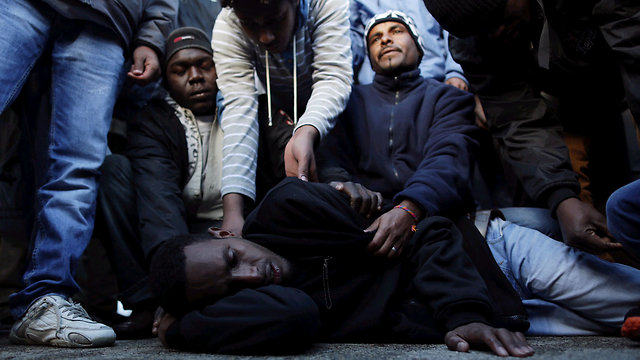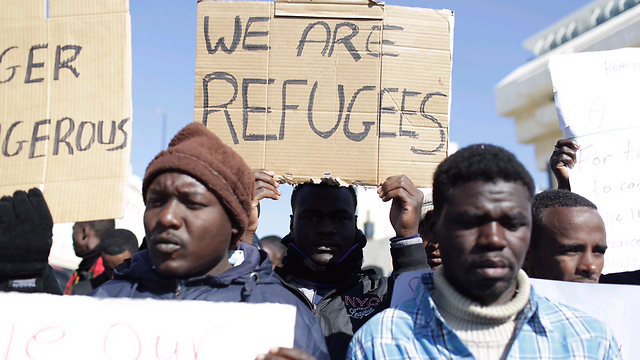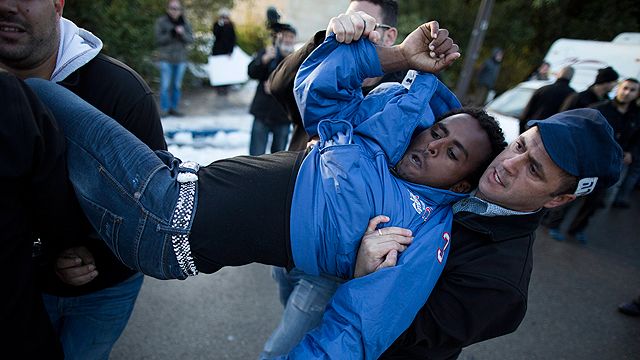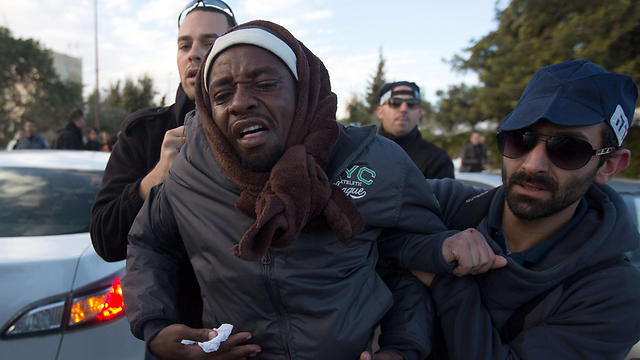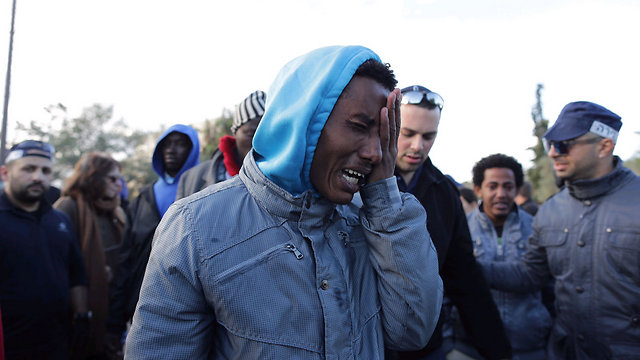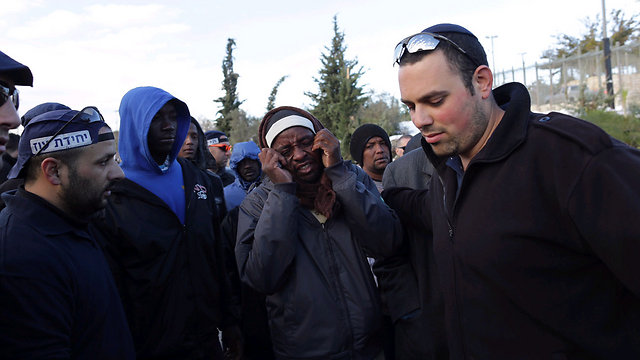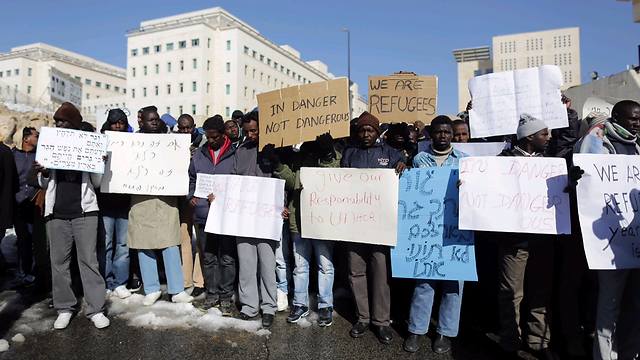The asylum seekers' protest at the Knesset on Tuesday quickly turned into a violent confrontation with security forces.
Police officers of the Immigration Police announced to the protesters via megaphones that they had to get on buses and return to the detainment center, or they would be arrested. As a result, the protesters tried to block the road adjacent to the Knesset, and prepared for an altercation.
Related stories:
- Following opening: infiltrators flee from Holot facility
- New migrants' detention facility gears for opening
- Knesset approves Infiltration Prevention Bill
The protesters said they opposed any arrests by force, but that they would not board the buses. Yossi Edelstein, the director of the Foreigners Department in the Immigration Authority, warned that if they do not return to the facility, his officers would begin enforcing the law.
According to a new amendment to the Prevention of Infiltration Law approved by the Knesset last week, anyone held in the open detention facility can be detained within 48 hours of leaving it and jailed in the closed Saharonim facility.
Several of the asylum seekers boarded the buses of their own accord, while others were forced on by Immigration Police. Activists supporting asylum seekers cried out: "You should be embarrassed," and "They dragged your grandfather like that."
The asylum seekers arrived in Jerusalem two days after they left the open Holot facility in the south, where they were sent on Sunday. They left the facility and started walking towards the capital, demanding that government authorities look at their request to be considered political refugees.
Prime Minister Benjamin Netanyahu said in response that the infiltrator law will be enforced.
"Just as we are determined to protect our borders, we're determined to enforce the law," he said. "The law is the law, and naturally it also applies to illegal workers. The infiltrators who were transferred to the special detainment facility can either stay there or go back to their home countries."
Netanyahu made his statement at an event marking 60 years of the Border Guard.
"We put a complete end to the infiltration by building a fence, as well as with the help of the Border Guard and other units."
Lawyer Tony Garcia from the Office of the United Nations High Commissioner for Refugees, who escorted the migrants, told Ynet: "We are concerned about their situation. The refugee seekers are desperate and therefore decided to launch a protest march under harsh conditions."
He explained that according to the UN Refugee Convention, Israel must look into each asylum request individually, but that the State has been failing to do so as a policy in recent years.
"We have discussed it with senior Israeli officials, but they have yet to provide us with answers," he explained.
The asylum seekers protested in front of the Prime Minister's Office in Jerusalem on Tuesday, carrying signs saying "We are in danger; we're not dangerous." They were received with rounds of applause by some 100 additional protesters who came to support them.
'Reduce number of infiltrators'
Interior Minister Gideon Sa'ar told Ynet: "We intend to stick to our policy and reduce the number of infiltrators in city centers. We will also transfer infiltrators from city centers to detention facilities. Those who violate regulations at the open facility will be moved to the closed facility.
According to the minister, the number of migrants leaving the country is on the rise. "If the State of Israel allows infiltrators to stay in city centers and make a living, there will obviously be no willful emigration. Most Israeli citizens do not believe the country should harbor everyone who infiltrates into Israel."
The minister said addressed claims that the State was not looking into asylum requests and said he was reviewing requests every week. "Most of the requests reveal that applicants are not refugees – most of them enter Israel with the desire to earn money and improve their quality of lives.
Sa'ar said that the State cannot bear to take in "massive infiltration, as it draws Israel into great hardship."
The minister added that activists who were supporting asylum seekers during Tuesday's protest were "spreading lies against the State of Israel."
According to the Israel Prison Service, 280 refuge seekers left the facility where they were placed last week among 483 detainees from Shaharonim. The Holot facility is open during the day and closed at night. Those held in the detention center may leave during the day as long as they report to the facility three times a day and return at night.
Additional detainees left the facility on Monday. Within the past three days, more than half of the detainees left the site.
- Receive Ynetnews updates
directly to your desktop














